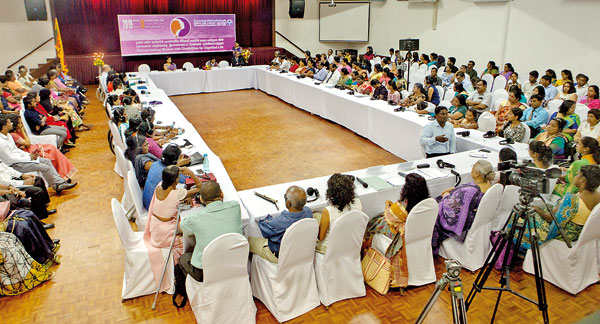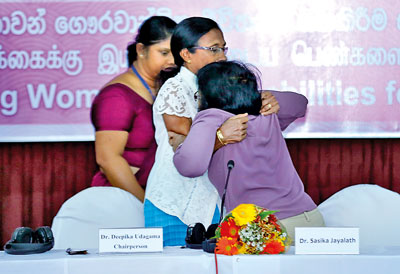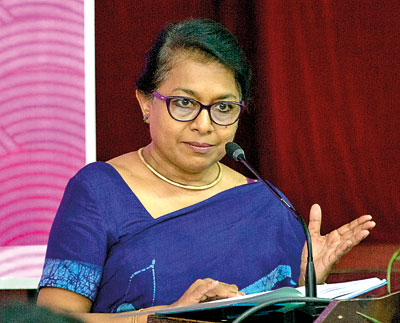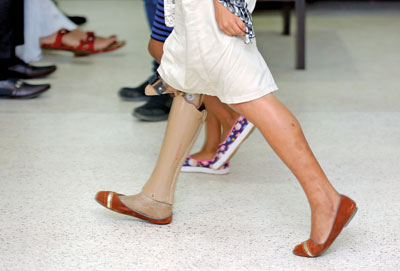News
Disabled women’s rights to the fore

All are equal, is the message being given loud and clear through the rectangular seating arrangements
It was the irony of ironies!
Friday, International Women’s Day, saw people from all over the country gathering for a crucial half-day session on the theme ‘Mainstreaming Women with Disabilities for a Dignified Life’ organised by the Human Rights Commission of Sri Lanka (HRCSL), under the dynamic leadership of Chairperson Dr. Deepika Udagama at the Sri Lanka Foundation Institute (SLFI), Colombo 7.
“As I drove into the SLFI, I saw a parking spot marked for the disabled. But when I wanted to park there, I was told that it was for a ‘Stores’ vehicle,” said Chief Guest Dr. Shashika Jayalath revealing the day-to-day reality of what is faced by all those living with disabilities in Sri Lanka.
Dr. Jayalath, having overcome numerous challenges thrown at her due to her physical disability, is serving the people at the Panadura Base Hospital.
The organisation of this important session by the HRCSL, however, was very commendable. Abandoning the stage which has to be ‘accessed’ by several steps, at centre-stage of the auditorium seated in a large rectangle were all those special people…….taking their rightful place in society, not seeking sympathy but empathy to discuss what their rights are.
Heartwarming was the fact that even though it was an event to do with women, with a pink banner highlighting the theme, there were men too, as both women and men are equal partners.
It was a fantastic sight to behold…….wheelchairs drawn up to the table, crutches leaning against the table, people sporting dark glasses seated with white canes before them on the table, a sign language ‘speaker’ before a group and many more…….and the auditorium was full. All the three languages, Sinhala, Tamil and English, were used.
Focusing on education, health, employment and family affairs of disabled women, the discussions at the roundtable have come up with several proposed policy interventions that are to be forwarded to the relevant authorities and what type of redress mechanisms should be available as oversight bodies.
Of all disabled persons around the world, 57% are women, according to a report of the Joint Front for the United Nations Quarterly Review 2017.
It is Dr. Udagama who stresses that as a vulnerable group these women are subjected to various types of abuses and ill-treatment in day-to-day life. “As the Human Rights Commission it is our mission and responsibility to make this vulnerable group in Sri Lanka aware of the challenges they come across in their daily lives and empower them to overcome these ordeals.”
If asked, how I see women in Sri Lanka, Dr. Udagama said, the usual answer is that when compared to other South Asian countries, we have remarkable achievements in education and health. But we need to look beyond – in the Cabinet of Ministers there are only two women; in the independent commissions there is only one woman-chair and with regard to political representation, Sri Lanka has the lowest.

Dr. Shashika Jayalath is supported by her mother to take her seat, while ready to lend a helping hand is Attorney-at-Law Menaka Herath of the HRC
“There are also very few complaints about gender discrimination to the HRCSL and hardly any applications to the Supreme Court with regard to the same issue,” she pointed out.
The premise for the 63-page report of the HRCSL which came out on Friday is defined by national and international instruments such as the Sri Lanka Constitution, the Convention on the Elimination of All Forms of Discrimination Against Women (CEDAW) and more, it is learnt.
And the report encapsulates the views and recommendation of women with disabilities and other representatives of public and civil organisations who had taken part in roundtable discussions organised by the HRCSL Regional Offices in Batticaloa, Ampara, Matara, Kalmunai, Badulla, Kandy, Vavuniya, Jaffna, Anuradhapura and Trincomalee and the Sub-Offices of Kilinochchi, Nuwara Eliya and Puttalam.
Here are the problems encountered by women with disabilities in the key areas of education, health, employment and family affairs and recommendations by the HRCSL.
Education
Challenges:
Not even the minimum facilities required for inclusive education accepted worldwide are available in the school system of Sri Lanka. The shortage of special education teachers is another potential reason for children with disabilities to leave school early. Preliminary interviews suggest that a combination of factors, including the challenging nature of the job, particularly in the context of poor infrastructure facilities, social stigma attached to special education and the higher status accorded to regular education teachers, induce many teachers to switch from special education to regular education. Opportunities and minimum facilities required by students with disabilities are not up to minimum expected standards in all higher education institutions, while these students also lack the freedom to choose preferred subject streams. Physical accessible facilities available in every higher education institutes are far below standard and not at all sufficient.
Perceptions and attitudes towards different types of disability vary among different stakeholders. Many professionals are skeptical of the idea of inclusion and prefer to provide education separately from the regular classroom.
There is a strong need for more material/equipment essential for the learner’s education, functional independence and interaction with others in the learning environment. Low-cost assistive devices such as large print books, Braille textbooks and talking books are unavailable in many public institutions. Assessment processes are often found to be inflexible.

Human Rights Commission Chairperson Dr. Deepika Udagama
Lack of proper infrastructure facilities including accessible and/or separate toilets for girls with disabilities.
Children of disabled parents are neglected at schools because their parents cannot attend parents’ meetings.
Recommendations:
Necessary government intervention and legal provisions to establish the concept of inclusive education.
Policies should be adopted to allow the children to choose the streams of their preference and provide learning equipment in accessible learning formats.
Teacher training and appointments by type of disability, to ensure that children with all types of disabilities have access to competent teachers. More training and seminars need to be introduced on inclusive education strategies to reinforce the teachers’ professional ideas of accepting students in need.
Proper public awareness on early identification and intervention support, medical and therapeutic services and early childhood education and schooling.
Technology and distance learning should be made accessible to allow students with disabilities to continue living at home while studying, sharing documents, exchanging ideas and making presentations.
Providing schools and universities with separate adequate infrastructure facilities for girls with disabilities, to lessen dropouts.
When charging facilities fees in schools, an exception should be made for disabled children.
Employment
Challenges:
The generation of employment for vulnerable groups especially in under-developed regions. Even though national legislative enactments, regulations and international conventions accept the right persons with disabilities to work, policy implementation, however, is inadequate.
Limited opportunities of vocational training and skills development for these groups.
Even though there has been an increase in the school participation of disabled children and the number of disabled persons seeking vocational training, mechanisms have not been developed to absorb them into the labour market. Transport difficulties and inadequate disabled-friendly working environments with dangers such as sexual abuse at the workplace discourage persons with disabilities from participating in the workforce and in vocational training.
Given that the disabled are also amongst the poorest in the country and highly dependent on others, measures to empower them and integrate them into society will benefit them, their families and society.

They all came to take their rightful place at the International Women’s Day event organised by the HRC (above and left). Pix by Sameera Weerasekera
Recommendations:
There is a strong need for proper data.
Based on the personal characteristics of the vulnerable – skills, interests, knowledge, ability and talents – action should be taken to make them build up small and medium enterprises (SMEs). Training in SME management is of extreme importance to them. Women could be motivated to become owners/ proprietors of such ventures.
Awareness among parents, persons with disabilities and their caregivers on the benefits of participation in training and employment for the disabled. By re-establishing the industrial base in the north and east, which was destroyed during the war, a large number of employment opportunities can be created for both men and women.
Increase institutional responsiveness to meet the needs of the disabled and bring about a supportive environment in the workplace.
Introduction of special concessions (such as tax concessions, exemption from statutory payments and financial assistance) to employers of persons with disabilities to improve physical facilities.
Health
Challenges:
When a child with a disability is born, parents do not have any information on how to bring up this child.
Lack of information on disability in hospitals.
Doctors and health sector officials only have a charity-based and medical-based approach and not a right-based approach.
Lack of knowledge on how to interact with persons with disabilities, especially the hearing-impaired who do not have access to healthcare due to communication gaps.
Lack of access to hospitals.
Labels on medicine packs and instructions on how to take medicine not available in accessible formats.
Lack of information on pregnancy and parenting for mothers with disabilities and challenges during childbirth.
Lack of health insurance facilities.
For blood and urine tests, disabled patients have to walk a long way from one section to another, in a hospital.
Recommendations:
Establishment of a Disability Help Desk in every hospital can be perceived as a promising measure. Recruitment of persons with disabilities to be in-charge of the Help Desk. Appoint a health official to aid the disabled in the hospital premises.
Display leaflets of organizations working for persons with disabilities.
Conducting awareness programmes on reproductive health for both young disabled women and their parents.
Provide all information in accessible formats such as Braille, large print, audio, sign language, printed, e-copies (Sinhala copies in Iskolapotha font and Tamil in Latha font), simple text etc.
Sensitization of doctors and other health officials on rehabilitation facilities, vocational trainings, access to education, assistive devices, employment opportunities and other related facilities available for persons with disabilities.
Training health staff on “disability etiquette”. Public Health Midwives should also be trained on how to give information to mothers with disabilities and make all leaflets in accessible formats. Make the Labour room and maternity ward accessible and train the doctors and staff members on how to handle mothers with disabilities. Authority to allow an extra person to stay with the mother with a disability.
Conduct access audits to give recommendations to the authorities.
Allow acceptance by health insurance companies and the validity for them to apply for health insurance facilities.
Family affairs
Challenges:
Violence against women who have a disability and face sexual harassment and sexual exploitation in the home, community, workplace and society at large is at a serious level, with hidden or undiscovered incidents.
The legal situation is not conducive to ensuring justice for women who have a disability.
There is still no legal provision for abortions, in the case of sexual harassment-related pregnancies which ultimately worsen the life status for women who have a disability, without any help or expectation. This situation seriously affects women who have an intellectual disability or is deaf and hard of hearing.
Poor women with disabilities face more challenges in their livelihoods.
Women with disabilities receive insufficient opportunities to acquire knowledge and skills in family planning and leading a healthy lifestyle. There is a lack of knowledge in sexual and re-productive health.
· Domestic violence and harassment inflicted on women with disabilities; discrimination against women with disabilities when it comes to marriage and having children. They are not allowed to make their own choices and decisions in life but kept under the rule of the family.
Families deciding that they should not be given family wealth, as others might exploit them.
Recommendations:
The government should establish by statue an independent ‘Disability Rights Commission’ to protect, promote and realize the rights of disabled persons including disabled girls and women. This commission should include a specific complaint mechanism which will aid disabled women to lodge complaints against harassment and violations. It should also comprise an inquiry and investigations mechanism to monitor reported violations and harassment and facilitate rehabilitation for the victimized.
The local authorities and police stations should be sensitized to act when such harassment or violence is reported where the specific condition of the victim is taken into account and a counter-measure taken to prevent such violations.
Specific laws should be amended in terms of sexual offences, while addressing the lack of law enforcement in marital rape.
In relation to statutory rape, the punishment given for engaging in sexual intercourse with a disabled girl below the age of 16 needs to be looked at and the lack of specific laws on statutory rape in this regard should be redressed.
Specific measures to record statements which would allow the victim to make their statements with ease should be introduced to the police and local authorities. (This could include the use of Braille or a sign language translator.) Sensitization and training of police officials to handle issues of disabled parties.
To create a disability inclusive legal profession where the legal system is revolutionized to incorporate specific needs of the disabled community, especially in the instance of disabled women giving evidence at court regarding harassment and rape.
The issue pertaining to abortion rights is applicable to all women who are legally denied the right. However, the impact felt by disabled women who are subjected to harassment related pregnancies is greater and the lack of specific consideration of such recommendations should be incorporated into the law. To counter the situation — abortion laws should be amended to allow abortions that occurred due to harassment-related pregnancies for all women; if abortion laws are not amended, a counter-measure should be implemented to specifically facilitate disabled women who face such pregnancies, where a specific system is formulated to cater to their physical, mental and social conditions; laws should be altered to include severe punishments to perpetrators; a compensation or remuneration mechanism should be implemented.
Sensitization towards disabled people should be included in school curricula.
Encourage all local universities to establish Departments of Disabilities.
Integrate programmes on disability rights and conditions into vocational training curricula and employee training programmes.
Facilitate family planning training programmes for women with disabilities, joining up with the Family Planning Association to incorporate specific issues and how to overcome them (child care and pregnancies). They should also include topics such as sexual and reproductive health, pregnancy and post-pregnancy etc.

